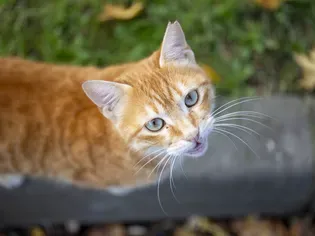Can Cats Eat Grapes?
Updated on 05/27/24

Can Cats Eat Grapes? A Comprehensive Guide to Feline Grape Consumption
Introduction
Grapes are a popular fruit enjoyed by humans worldwide, but are they safe for our feline companions? The answer is a resounding no. Grapes are toxic to cats and can cause serious health problems, even in small amounts. In this comprehensive guide, we'll delve into the why and how of grape toxicity in cats, providing you with the essential knowledge to keep your furry friend safe.
Why Are Grapes Toxic to Cats?
Grapes contain toxic substances known as tartaric acid and oxalates. These compounds can disrupt multiple organ systems in cats, including the kidneys, gastrointestinal tract, and nervous system.
Tartaric Acid: Tartaric acid is a naturally occurring acid found in grapes. In high doses, it can damage the kidneys, leading to acute kidney failure.
Oxalates: Oxalates are organic compounds that can bind to calcium and form insoluble crystals. These crystals can accumulate in the kidneys and urinary tract, causing kidney stones, inflammation, and even urinary tract obstruction.
Examples of Grape Toxicity in Cats
The effects of grape toxicity in cats can vary depending on the amount consumed and the individual cat's sensitivity. Some common symptoms include:
* Vomiting
* Diarrhea
* Lethargy
* Loss of appetite
* Abdominal pain
* Increased thirst and urination
* Kidney failure (in severe cases)
Treatment for Grape Toxicity in Cats
If you suspect your cat has ingested grapes, it's crucial to seek veterinary attention immediately. Treatment typically involves:
* Inducing vomiting to remove any remaining grapes.
* Administering activated charcoal to absorb toxins.
* Intravenous fluids to maintain hydration and flush out toxins.
* Monitoring kidney function closely to detect any damage.
Prevention is Key
The best way to prevent grape toxicity in cats is to keep them away from grapes and grape products entirely. Here are a few tips:
* Store grapes in a sealed container out of reach of cats.
* Do not give cats grape-flavored candies, treats, or juices.
* Be aware of grapes in pet food or treats.
Alternative Fruit Options for Cats
While grapes are not safe for cats, there are other fruits that they can enjoy in moderation. These include:
* Blueberries: Rich in antioxidants and fiber.
* Bananas: A good source of potassium and fiber.
* Apples: High in vitamin C and fiber.
* Cantaloupe: A good source of water, antioxidants, and vitamin A.
Conclusion
Grapes are a delicious and nutritious fruit for humans, but they can be deadly for cats. By understanding the dangers of grape toxicity and taking preventive measures, you can ensure the health and well-being of your feline companion. Remember, if you suspect your cat has consumed grapes, seek veterinary attention immediately.
Explore More Pets

Cat Behavior Problems
How to Stop Aggression in Kittens

Long-Haired Cat Breeds
Siberian Cat: Breed Profile, Characteristics, & Care

Cat Behavior Problems
How to Stop Kittens From Scratching and Biting

Long-Haired Cat Breeds
Turkish Angora: Cat Breed Profile, Characteristics & Care

Basic Training
How to Socialize Your Kitten

Short-Haired Cat Breeds
Cute Pictures & Facts About Calico Cats & Kittens

Litter Box Training
Training Your Kitten to Use the Litter Box

Long-Haired Cat Breeds
10 Fun Facts About White Cats
